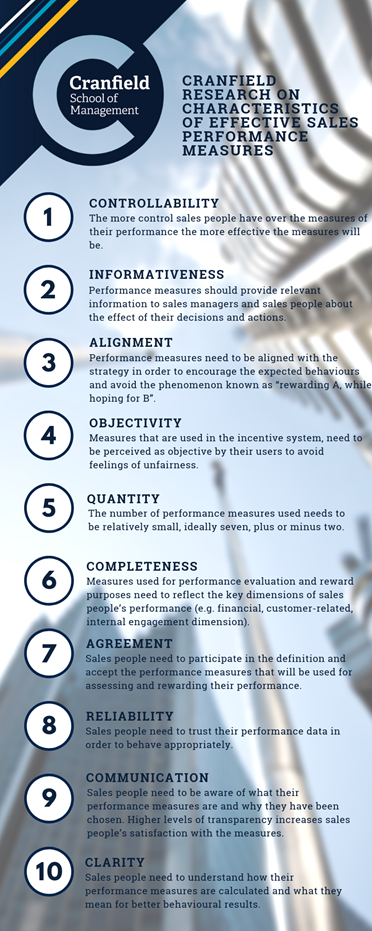
Sales organisation’s face many dilemmas when managing and measuring sales performance. Sales people may be doing the right thing and may be displaying the right, behaviour, but their results are not captured in the performance measurement systems of their organisations. Very often individuals find themselves trading off between behaviour-based and outcome-based measures.
The complexity of sales roles is increasing, team selling is now a critical sales capability, transactional selling is being replaced by internet selling and thus, new approaches for consultative selling are becoming the norm. Customers, in most markets are becoming more discerning, and demanding new creative ways of adding value to their business. Most of these transformations are not being reflected in the type of performance measures that managers use in sales.
The problems with measures
The aim of measuring sales performance is to improve sales performance. This statement seems obvious and even redundant. However, many organisations design and roll out performance management systems that achieve precisely the opposite of enhanced performance. The problem is that achieving a measured target becomes an ‘end’ in itself when a measure should be a ‘means’ to achieve higher performance.
Sales performance, is by its very nature, a complex, interconnected and often subjective phenomenon. Therefore, most attempts to measure ‘performance realities’ will be limited. Sales managers need to be aware of certain characteristics most sales measures have such as:
- Imperfection
- Stickiness
- Conflicting roles
- Inconsistency
Why it is essential to have a good measurement system
A good system of measures of sales performance will allow a more efficient allocation of resources, and more importantly, will help the perceived fairness of the system, which in turn, positively affects motivation and performance. There are several characteristics of sales performance measures with significant effects on sales people’s behaviour.
Designing and using measurement systems for Sales Performance effectively
There is not such as a thing as the perfect measurement system in sales. However, there are practices that will help create a more effective system. A measurement scheme that will enable the occurrence of desired organisational outcomes and minimise undesired ones. Thus, to create such systems, sales managers are encouraged to:
- Define performance measures at various levels.
Try to go beyond the individual and define measures for the team and/or the unit. Team-based selling has grown significantly over the last two to three decades and increasingly used to bring about enhanced performance.
- Use both subjective and objective, outcome and behaviour-based measures.
Each of these approaches has its merits and disadvantages. Salesperson performance has both subjective and objective dimensions.
- De-couple measures, targets and incentives.
Given the complexity of the sales performance phenomenon and the intrinsic imperfection of most measures, it is advisable not to link some measures to targets and incentives. A good measurement scheme should underpin organisational learning and drive innovation by identifying where the organisational system could do better and more.

Redefining performance and its measurement
Performance in sales is very context specific. A study by Willem Verbeke and his colleagues provided a synthesis of decades of research into sales performance. It revealed that five key dimensions help explain performance in sales.
- Selling related knowledge
- Adaptiveness of the sales person
- Role clarity
- Cognitive aptitude that enables salespeople to select appropriate data to inform customers
- Work engagement, that facilitates the creation of networks, both internal and external.
Most of the drivers of sales performance are imperfectibly measurable, but essential in bringing about growth.
Effective measurement systems are the ones that will put into context each sales person’s performance contribution, allowing it to be recognised for what has been achieved now and for the meaningful contribution in the future. Good sales performance measurement systems are therefore holistic, balanced and orientated to supporting long-term value creation.
Dr Monica Franco-Santos, Reader in Governance and Organisational Performance, faculty on Sales Directors' Programme, Cranfield School of Management.
Dr Javier Marcos, Programme Director of the Sales Directors’ Programme, Cranfield School of Management.




